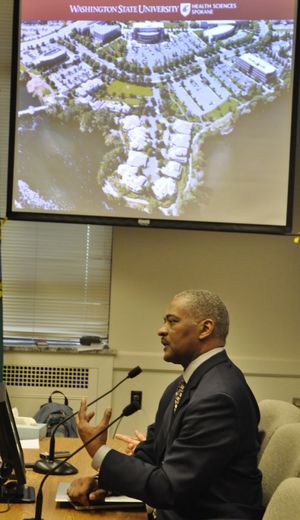WALeg Day 11: No need for boxing gloves at Spokane med school session
OLYMPIA – Washington State University wants to continue to collaborate with the University of Washington on medical education, WSU President Elson Floyd told legislators Thursday. But it wants its own medical school in Spokane, too.
UW isn’t opposed to WSU starting a new medical school, officials from that university told the Senate Higher Education Committee a few minutes later. With one caveat:
“We would only object to a proposal if it were done at the expense of the (UW) program,” Regent Orin Smith said.
Leaders from both universities laid out their plans to expand medical school education in Spokane and increase the number of doctors in family practice and internal medicine, and those who would work in small towns or rural practices.
WSU wants to set up what Floyd called a community-based model that relies on the local medical institutions rather than its own research hospital. “We are not duplicating what already exists,” he said, and the state has already made the capital investments in the Spokane campus so the costs would be primarily operating expenses.
It wants to have its first class of 40 students in 2017, doubling that in two years and increasing to 120 students a year by 2021. It wants $2.5 million to hire staff, set curriculum and begin the accreditation process needed for a new school.
But the UW medical school already is among the best in the world at turning out primary care doctors, UW President Michael Young said, through its WWAMI program, named for the five states that participate: Washington, Wyoming, Alaska, Montana and Idaho.
“Our program is scalable,” Young said. “We are happy to scale up.”
UW wants $8 million to begin scaling up its WWAMI program in Spokane. It has plans to enroll 80 students per year in Spokane in 2017 and 120 per year in 2021.
The two universities were making their presentations at a “work session”, which meant the Health Care Committee wanted general information and wasn’t taking testimony on a particular bill. Chairwoman Barbara Bailey, R-Oak Harbor, joked before the session that she’d been looking for boxing gloves for the two presidents to wear for their presentations “but I haven’t been able to find any.”
But the presentations followed a memorandum of understanding the two universities signed when they broke off their cooperative agreement for WWAMI at the WSU-Spokane campus at Riverpoint, agreeing not to oppose each other’s efforts as they go their separate ways. A second such memorandum, to spell out how to split up state operating funds and the use of buildings on the campus, is still under discussion.
Bailey said the session but helped committee members understand some of the problems of increasing the number of physicians around the state, including the need for more residency slots to trains students after they graduate from medical school. She didn’t draw any conclusions about which direction to go on expanded medical schools in Spokane, but said a bill that would give WSU the authority to have its own school will get a hearing in that committee in the coming weeks.
Identical bills to change a law that gives UW the exclusive rights to a medical school have been introduced in both the Senate and the House Wednesday. Rep. Marcus Riccelli, D-Spokane, sponsor of the House bill, said that proposal gained five co-sponsors after it was introduced, bringing the total support to 65 in the 98-member House.
Not a fan of a WSU medical school, however, is Rep. Eileen Cody, chairwoman of the House Health Care and Wellness Committee. Cody told Spokane-area residents in Olympia on a lobbying excursion co-ordinated by Greater Spokane Inc., that she said the issue is the lack of residency spots, not the need for another school to train primary care physicians.
But Riccelli’s bill will be sent to the Higher Education Committee, not Health Care and Wellness.

